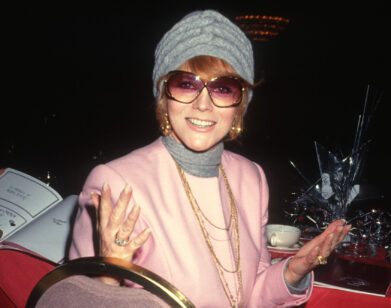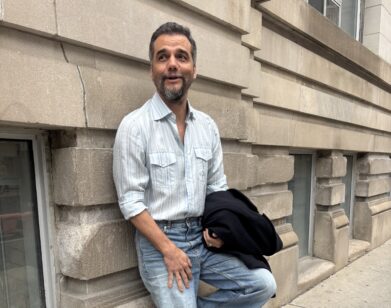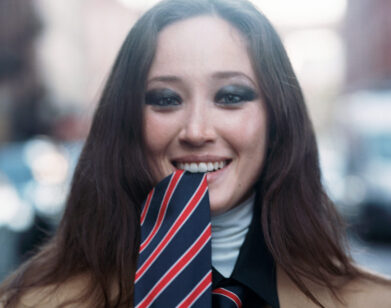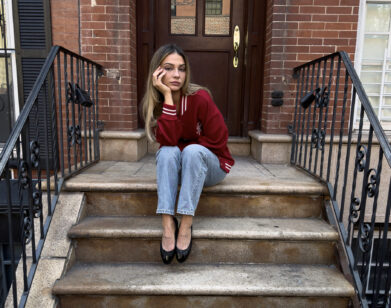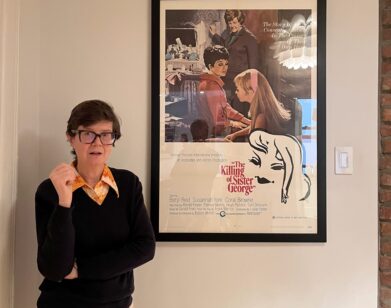Marion Cotillard, Queen of Scotland
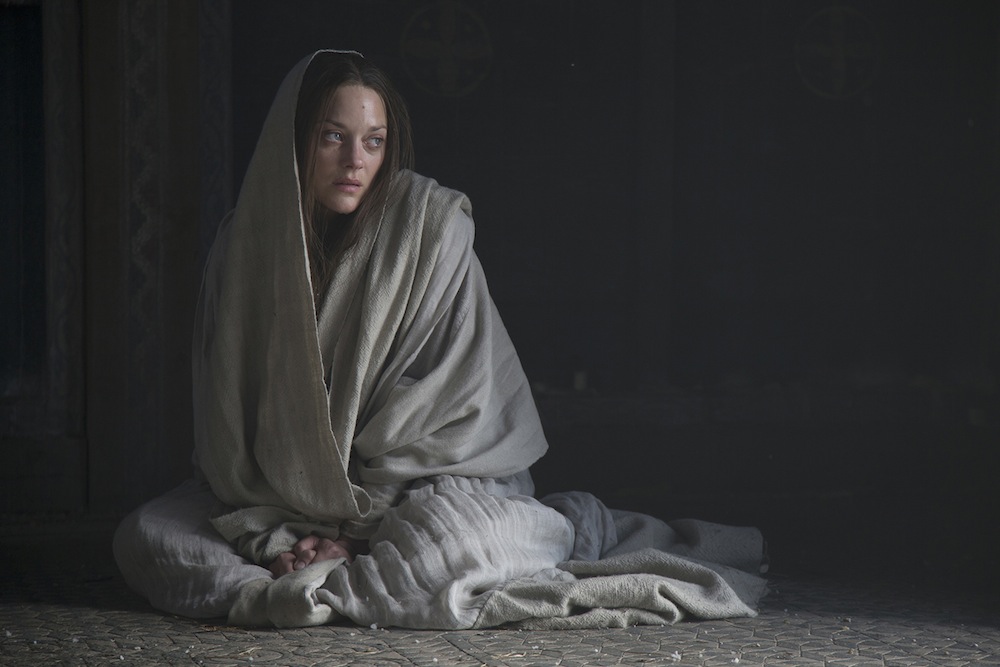
ABOVE: MARION COTILLARD AS LADY MACBETH. PHOTO COURTESY OF THE WEINSTEIN COMPANY.
If Justin Kurzel‘s Macbeth feels radical, it is because it is not trying to be radical at all. Kurzel is not attempting to put a new spin on the most sacred of classic texts—we’ve seen that and it’s generally not very interesting. Rather, he is stripping it down to its rawest form; Macbeth par excellence. Scotland, untamed and elemental, is a character in itself, both villain and hero. The screen is sapped of color except for the blood reds of battle scenes and sunsets, and zombie-blue eyes of the young boys fighting as men alongside Macbeth and his comrades. Everything that makes the Scottish play fantastical is replaced by the grim inescapability of death. The three witches are three women, an infant, and a young girl. They do not cackle or call for the spirits but deliver their lines in a near-catatonia.
At the center of the action are several extremely strong performances. There is the ever-talented Sean Harris as Macduff, the man who was not born of woman; Michael Fassbender as the unraveling Macbeth; and Marion Cotillard as Macbeth’s partner in crime.
Macbeth is only Kurzel’s second film. When the Australian director signed on to the project, Fassbender was already attached. Together, they decided to approach Oscar-winner Cotillard to play Lady Macbeth—a rare offer for an actress whose first language is not English. Now, the three are working together on the adaptation of the video game Assassin’s Creed.
EMMA BROWN: Do you remember the first time you saw or read Macbeth?
MARION COTILLARD: The first time I saw Macbeth was not the entire play. It was at acting school, and this student was working on Lady Macbeth’s soliloquy. I felt something very special, and I knew then that I would one day experience Lady Macbeth, but I always thought it would be on stage and in French.
BROWN: If you had the opportunity to do it on stage in French, would you do it again?
COTILLARD: No, I’m not sure. That was a very, very heavy role. Very dark. She was very hard to live with. I think I had my experience. I actually thought it might be interesting to do it in English on stage, but then I came to the conclusion that it was not a good idea either.
BROWN: Are you generally quite good at separating your life on set from your personal life?
COTILLARD: I didn’t have that problem—it’s not a problem—but I didn’t have to deal with going back home at night without my character. I’m not a method actor, but I’m affected by the life I share my life with during shooting. It’s always a very strange and special period for me. But before I was a mum, I could live in another dimension, create another world, and it wouldn’t bother me if I was not totally available or totally myself. Today I cannot do that anymore. I’ve been working on it and I think I do pretty good.
BROWN: Did you know anything about the director Justin Kurzel before he approached you to play Lady Macbeth?
COTILLARD: No, I didn’t know anything. I hadn’t seen his movie [The Snowtown Murders] then. We talked on the phone. I was very surprised that they would ask a foreign actress to be Lady Macbeth, but I felt it was an opportunity that I couldn’t miss. Having the opportunity to play Shakespeare in English, that wouldn’t come twice. After I saw his movie—because I was very surprised that a director would do an adaptation of Macbeth for his second movie—and I talked to him, I thought it made total sense that he would take on such a deep play. I was very confident that he would do an amazing job.
BROWN: In past interviews, Justin has talked about how the script for Macbeth reminded him of a western. Is that how he pitched it to you?
COTILLARD: Not really. He talked to me about the humanity of these two characters. He wanted to show this couple who are very in love with each other, but they are struggling with their own fears and pains, and that disconnects them from who they are.
BROWN: Lady Macbeth has those two really famous soliloquys, when did you start talking about them—about the “out, out, damn spot” one in particular?
COTILLARD: We had a rehearsal period that last a month and a half. It was really like a theatrical rehearsal process. During the preparation, we went through all the scenes and worked on the meaning of each word because Shakespeare can put a lot of different meanings to one sentence, so you have choices to make. But it was only the day we shot the scene that [Justin] said he would probably not cut. I got super scared. But then, because of what he had set up for this scene, everything became kind of easy.
BROWN: Do you have a favorite line from Lady Macbeth?
COTILLARD: What she says is really, really strong and violent most of the time. [laughs] The one that comes to my mind is really, really horrible, actually, but for some reason there is in this line all the humanity and monstrosity that she carries when she says, “I have given suck, and know/ How tender ’tis to love the babe that milks me/ I would, while it was smiling in my face/ Have plucked my nipple from his boneless gums/ And dashed the brains out, had I so sworn as you/ Have done to this.” In there, there is the loss of her child, there is the pain, there is the fear, there is the madness, there is the power, there is everything there.
BROWN: Do you think Lady Macbeth is motivated by what she wants for her husband, what she wants for herself, or what she wants for the both of them?
COTILLARD: I think it’s what she wants for them. Not only for her or for him. I think it’s pretty clear in the movie and that’s what Justin told me about when we first talked: that love is keeping them together and will tear them apart.
BROWN: The ending of the film is very striking. I’ve read and seen Macbeth more than once, but I’ve never really thought about the threat of Fleance taking up the prophecy after Macbeth’s defeat.
COTILLARD: This is what’s interesting with Shakespeare. Everything is written in the play—like the line I just gave you from Lady Macbeth tells that she had a baby, and Fleance, the prophecy, says that Banquo’s descendants will be king; he is at the descendants of a line of kings, so obviously Fleance will be king. And with Shakespeare, you can interpret, and that’s why we worked with this Shakespeare expert. He gave us all the keys to understand and make our choices, because you can have many different interpretations about what the play says.
BROWN: Why do you think it’s important to keep doing new versions and productions of Shakespeare when it’s been done so many times before?
COTILLARD: Because he talks about the society he lived in, and the society has changed, but not that much. For me, what Macbeth is about is people who cannot face their fears and pain and instead of facing them and going beyond, they just run away and they try to cover this with power and violence, but it doesn’t work. You cannot escape what you have to deal with inside yourself. It will never bring good things. It will only bring madness. And I think that’s the world we live in.
BROWN: You’ve talked about all of the great actresses who have played Lady Macbeth. Was there anyone in particular you had in mind that you had to consciously rid yourself of?
COTILLARD: Judi Dench. She reached perfection, so it’s really, really hard.
BROWN: I heard that Justin’s wife once played Lady Macbeth.
COTILLARD: She never told me! I saw The Babadook and I hate watching moving horror movies—for me it’s a horror movie—and she’s such an amazing actress. She must have been an amazing actress for sure.
BROWN: Did you buy into the superstitions surrounding “the Scottish play” while filming?
COTILLARD: No, but we called it the Scottish play anyway.
MACBETH COMES OUT TODAY, DECEMBER 4, IN SELECT THEATERS.

